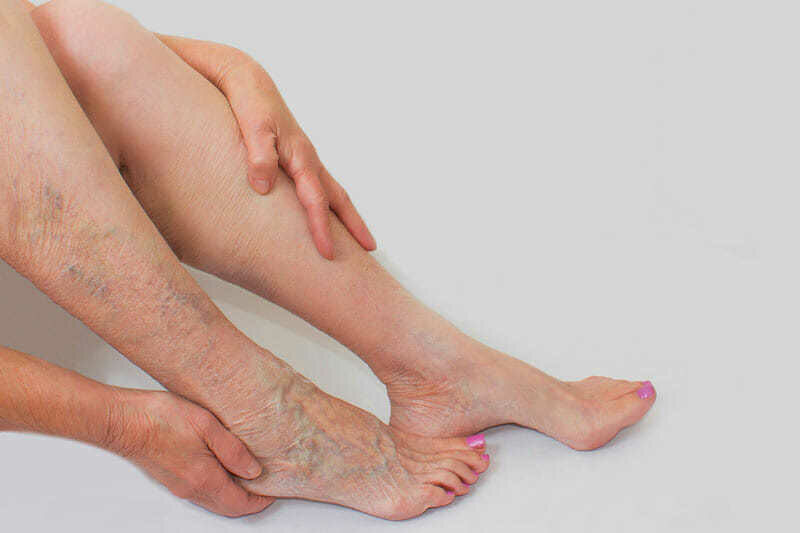
A New Era of Treatment for Varicose Veins
Treatment for varicose veins has come a long way with quick, non-invasive procedures that will have you in and out

Mental health issues can harm your physical well-being. It could also impact your veins.
Your physical and mental well-being are inextricably linked. Stress, anxiety, and depression can have a significant impact on your physical health. A debilitating chronic condition that causes you persistent pain, such as varicose veins, will likely also cause your mental health to suffer.
A 2013 study reviewed chronic venous disease and its effects on patients’ mental well-being. It concluded that as the disease progressed, patients reported worsening quality of life scores. However, by taking care of your mental health, you can improve your physical health — and your veins.
Varicose veins and the accompanying pain and swelling develop when tiny valves in the leg veins weaken to the point that they can no longer push blood back to the heart. Instead of circulating, the blood pools within the vein, eventually pushing the vein outward into thick, bulging lines on the legs and feet.
But how do varicose veins tie in with your mental health? Let’s look at stress and how it affects veins. Stress doesn’t cause varicose veins, but it can make the symptoms worse. When you're stressed out, your blood pressure rises. The rise in pressure slows your circulation as your veins struggle to pump blood. As the pressure within the veins grows, your blood doesn’t circulate properly. Instead, it collects within the vein walls, leading to bulging varicose veins. In addition, poor circulation in the legs can lead to dangerous blood clots or slow-healing sores on the leg.
Further, constant stress — as well as depression — zaps you of your energy and stamina. When you’re overly fatigued, you’ll skip your exercise routine and probably overeat to compensate for the loss of energy. Poor eating habits and lack of exercise lead to weight gain, putting more stress on overtaxed veins. Obesity is one of the main risk factors for varicose veins.
Perhaps most important, mentally feeling down may deter you from seeking treatment for either a mental issue or a chronic condition like varicose veins. But therapies are widely available for varicose veins — and mental health conditions — that can improve your physical and mental health.
In general, mental health has a compounding effect on your physical well-being — and vice versa. When you’re not feeling well either physically or mentally, you’re less likely to practice good habits like eating right and exercising. These healthy habits can clear your mind and make your body feel better. You can start by making some simple lifestyle changes that will improve your mind and body.
Make time each day to exercise. That doesn’t mean an hour-long gym workout. A brisk 30-minute walk or bike ride that engages your calf muscles helps circulate blood in your leg veins. It’s also a great stress reliever.
Try eating smaller, healthier meals during the day to boost your metabolism and circulation. Steer clear of fatty, salty foods that increase pressure on your veins. Combined with exercise, a healthy, well-balanced diet will help you shed pounds, which reduces pressure on the veins and can make you feel healthier.
If work stress is getting you down, take a break. Leave your office worries at the office. When you're home, relax and unwind with a hobby or another activity that makes you feel good. One simple habit you can try is to elevate your legs. Not only will it be calming, it also redirects blood in the proper direction up to the heart, reducing leg pain and swelling.
The pain and swelling caused by varicose veins can have a negative effect on your mental health. To reduce swelling and pain, wear a pair of compression stockings. These tight elastic stockings gently squeeze the veins, so blood circulates efficiently.
It's normal to feel stressed or blue occasionally. However, long-term stress or depression can adversely impact your physical well-being and must be addressed. Sadly, many people experiencing mental health issues may not seek the treatment they need. Anyone who feels that emotional distress is interfering with daily living should seek the counsel of a mental health professional.
Similarly, if you believe your varicose veins are lessening your quality of life, a vein specialist can propose a number of treatment options that will significantly reduce the discomfort of varicose veins. Once you receive this treatment, you may find you have a better outlook on life.
Center for Vein Restoration physicians take a holistic approach to treating veins disease. We treat varicose veins with the latest techniques, ensuring that our patients are happy with our services to live productive lives without the pain of venous disease. Contact us today for a consultation.